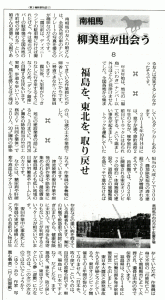Original Japanese written by staffer
The English below translated from the original Japanese by Heeday
The English translation edited by Rev. Dr. Henry French, ELCA
(Based on an article from the January 25th, 2016 edition of the Akahata newspaper)
(Excerpt from the newspaper article)
“A friend of mine, living in Minamisoma, Fukushima, has a daughter whose favorite pastime is taking photos of car license plates from many places in Japan. Said the daughter, ‘Before the 2011 disaster, I had to go to the parking lot of Disney Land, close to Tokyo, to take these photos. Today, I just visit a neighborhood supermarket and I see cars from all over Japan there.’ This daughter’s dad, a friend of mine, smiled ironically.
“During the New Year holidays, most of the license plates I saw said “Fukushima” or “Iwaki” (part of Fukushima Pref.) This was because most of the construction workers at work in Fukushima, who come from all over Japan, returned to their hometowns during the holidays. (A few workers were not able to do so, though.)
“After the 2011 disaster, large vehicles have been running around here, and some residents sarcastically call their own neighborhoods “dump truck Hollywood.” Yes, there are so many, and when I walk down a sidewalk, I often feel the wind caused by such trucks.
“Now, on October 14th, 2014, a certain girl, a 10th grader of Haramachi High School, was killed by a truck on the day right before a school trip. My son was a student of that High School as well. Tears —-. The truck driver was a construction worker, aged 74.”
According to a story from a local construction business within 20km (12.5 miles) of Minamisoma, the decontamination work joint venture led by Takenaka Corporation was planning to hire 200 more workers by this coming March. 300 more would be hired by another decontamination joint venture led by Taisei, another general contractor. Another 200 would be hired by Shimizu, yet another general contractor, who takes care of the decontamination of farms.
Meanwhile, in the Tokyo region, construction workers are busy building facilities for the 2020 Tokyo Olympiad and working on the accompanying renewal of infrastructure. Thus, the demand for construction workers is overheated.
In a situation like this, those working on reactor decommissioning and field decontamination, as well as the rebuilding of areas devastated by the 2011 disaster, are day laborers and currently homeless workers from a prefecture where the minimum legal wage is lower than that of Fukushima.
Some of those workers are aged and have serious health problems, such as diabetes, cirrhosis of the liver, hypertension, alcoholism, etc. Some of those workers become ill or injured at work, are carried to a hospital by ambulance where it is discovered that they have no coverage from Medicare-type public insurance, no money and no relative to help. We have seen many such cases.
In one such case, a certain construction worker passed away while working on the rebuilding of areas devastated in the 2011 disaster. The Minamisoma municipal government contacted his supposed relatives in what was thought to be his hometown. They found a person with his supposed name who was still alive. It was a pseudonym. Thus, the deceased worker was cremated as a “person who died on a journey” (a John Doe) as defined by the relevant Japanese law, and his bones are stored at a Buddhist temple in the municipality.
In 2014, Fukushima’s prefectural government declared an “emergency of fatal labor incidents.” Almost five years have passed since the 2011 earthquake and reactor meltdown, and I honestly wish the 2020 Olympiad was not going to be held in Tokyo. In a national election shortly after the 2011 disaster, the Liberal Democratic Party of Japan promised to “rebuild Japan.” OK, then why not rebuild Fukushima, rebuild Tohoku first? The Tokyo Olympiads are a fantasy that should come after Fukushima and Tohoku.
Today, in Minamisoma, we are seeing crimes being committed by some of the workers hired for the rebuilding, decontamination, and work related to the nuclear power plant. Still, many people do not want to make this criminal activity public, since that would discourage refugees from returning to the city even more. At the same time, however, ignoring the issue would turn the city into a smaller scale Detroit.
In the coming years, as more evacuation orders are lifted, we will have even more workers from outside coming here. Many of us here are experiencing how tough it really is to rebuild a town or city devastated by radiation into a place where people can live in peace and with ease.
